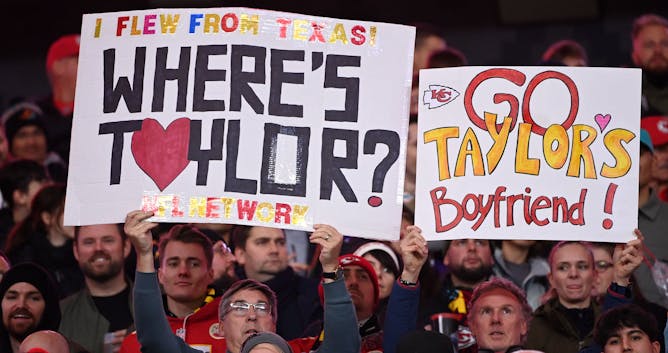|
Taylor Swift is a global economic powerhouse. The U.S. leg of the pop star’s Eras Tour added about US$4.3 billion to the nation’s GDP, according to Bloomberg, and recent sold-out dates in South America have been similarly lucrative. Meanwhile, her concert film has grossed more than $240 million globally − a world record.
So when Taylor struck up a romance with star U.S. football player Travis Kelce − and started attending games to cheer him on − the National Football League saw a golden opportunity to attract a new audience. Sports marketing professor Angeline Close Scheinbaum explains what other businesses can learn from the high-profile brand crossover − ahem, love affair − in her article 5 marketing lessons from the Taylor Swift and Travis Kelce romance.
|

Angeline Close Scheinbaum, Clemson University
Of course the NFL is embracing Taylor Swift.
|
Quote of the week 💬
|
-
"One big idea to understand is that airlines don’t earn very much money, if any at all, from ticket sales. This is mainly due to the highly competitive and capital-intensive structure of the airline industry, which often leads to reduced profit margins. Instead, they make their profits from bag fees, ticket change fees and — importantly — frequent flyer programs."
– Jay L. Zagorsky, Clinical Associate Professor of Markets, Public Policy and Law, Boston University, and H. Sami Karaca, Professor of Business Analytics, Boston University, from their story Airlines are frustrating travelers by changing frequent flyer program rules – here’s why they keep doing it
|
|
Trade
|
-
Danita Catherine Burke, University of Southern Denmark
The sealing industry has evolved but the EU’s ban on seal imports has contributed to the enduring cultural violence experienced by Canadian sealers.
|
|
Economy
|
-
Odongo Kodongo, University of the Witwatersrand
The negative investor sentiment and massive capital flight could be reversed by improved governance and accountability.
|
|
|
|
Inequality
|
-
Julie P. Smith, Australian National University; Catherine Pereira-Kotze, University of the Western Cape; Karleen Gribble, Western Sydney University
The report of the Women’s Economic Equality Taskforce mentions birth only twice, and breastfeeding not at all. Yet, properly valued, breastmilk contributes $154 per litre to the Australian economy.
|
|
Work
|
-
Serge da Motta Veiga, Neoma Business School
Relax: keeping your sense of humour and taking regular breaks will go a long way in helping you land a job.
|
|